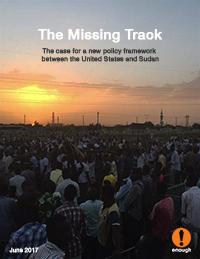 Note: This blog contains excerpts from the policy brief.
Note: This blog contains excerpts from the policy brief.
In a new brief published today, The Missing Track: The case for a new policy framework between the United States and Sudan, the Enough Project lays out a detailed plan for how the Trump administration can develop and implement a new track of engagement with Sudan focused on peace and respect for human rights – the absence of which helps perpetuate Sudan’s system of violent kleptocracy.
In early July, the Trump administration must make a decision: follow through on an Obama-era Executive Order from January 2017 to terminate the longstanding comprehensive sanctions on Sudan, or put the old sanctions regime back in place. The July decision point is part of a five-track plan that the Obama administration negotiated with Khartoum in an effort to achieve tangible progress on a limited set of issues: partnering on counterterrorism priorities, defeating the Lord’s Resistance Army (LRA), ending Sudanese support to South Sudanese armed opposition groups, enacting a cessation of hostilities, and expanding humanitarian access.
The new track of engagement argued for in the brief should focus on what should be the United States’ most pressing policy goals for Sudan: strongly supporting Sudanese advances in human rights, religious freedom, essential democratic reforms, good governance, and ultimately a comprehensive peace throughout the country.
“The fate of the Sudan sanctions regime currently hinges on five determining tracks that are incomplete in addressing a fundamental issue, that is, how to incentivize the Bashir regime to stop killing and oppressing its people.” – Omer Ismail, Enough Project Senior Advisor
Absent serious and meaningful progress toward these goals, the government of Sudan will maintain the longstanding patterns of behavior that have marked its rule for the last 28 years, and Khartoum will continue pursuing policies that have led to continuous deadly war, religious persecution, authoritarian governance, mass migration to Europe, grand corruption, and affiliation with and support for terrorist organizations.
As The Missing Track: The case for a new policy framework between the United States and Sudan explains, because the current five-track plan that the U.S. government is pursuing with Khartoum does not connect directly to political and governance reform in Sudan, and because the comprehensive sanctions regime was flawed in design and implementation, it is necessary to attach both new pressures and new incentives to this new set of goals. The new pressures should include very specific and robust network sanctions based on the best financial intelligence available and aimed at key officials and their networks who are undermining peace and human rights in Sudan, combined with anti-money laundering measures designed to achieve broad U.S. foreign policy objectives and protect the integrity of the U.S. financial system.

